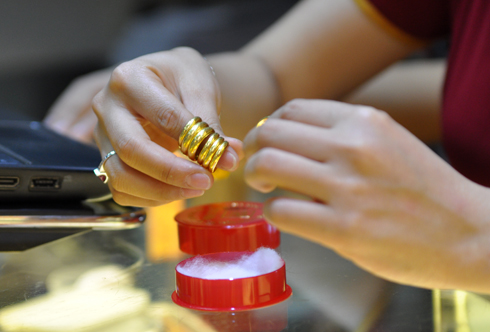Is gold still a safe place for Vietnamese wealth?

illustration photo
For many years now, we've trusted in gold. We consider it a safe, stable way of saving our money and accumulating wealth.
Gold is viewed as the guarantor of our rainy day funds.
That explains why at weddings, many brides are given gold from their inlaws, considering it a safeguard for her happiness. When people buy houses or sell their land, they often exchange "word-of-mouth" prices using estimations based on the price of gold.
But this also means when the price of gold drops, so do tears.
Dao Thuy, a resident of Nghia Tan Ward in Cau Giay District, said she and her co-workers agreed to buy several taels when the price dropped to VND43 million per tael in June (about US$2,009).
Now, it has dropped to around VND37 million ($1,800) per tael, and they've watched their money vanish into thin air.
Tuan Anh from Gia Lam District also bought 15 taels for VND41.5 million a piece, but at the current price, he could loose as much as VND100 million (nearly $5,000), a sum Tuan Anh moaned that he and his wife had saved for many years and wanted to use as their safety net.
According to Nguyen Minh Phong, head of the Ha Noi Institute for Socio-Economic Development, it was a similar scenario to the old days, when people saved rice, little by little, and put it into a jar in case of emergency.
Even though there are other ways to save or invest money, such as stocks, foreign currency and real estate, it's clear that people consider gold to be the safest option.
According to a Standard Chartered report in June last year, Viet Nam was the fourth biggest gold consumer in Asia, after China, India and Thailand. Large demand for gold here can be explained by high inflation, weak domestic currency and cultural factors.
Throughout history, Vietnamese people have preferred to buy gold, rather than depositing their money in a bank. It's like building a shelter against economic downturn, inflation and reduced consumption.
Even when prices drop, people still buy.
According to estimates from the Viet Nam Gold Traders Association, Viet Nam was estimated to have 1,000 tonnes of gold in savings, equivalent to 45 per cent of GDP. In many countries, that figure is less than 3 per cent, and it costs more to buy gold in Ha Noi than practically anywhere else in the world.
Phong said that the global gold price had fallen from a previous high down to about $1,235 per ounce. The economic recovery in many parts of the world, especially in the US, had also contributed to the drop, according to experts.
When the economy was down, demand for gold was higher. When the economy recovered, the tendency to sell gold for funding production or other purposes grew, according to experts.
Phong advised the public to be calm and monitor market trends before making any decisions.
However, it's easier said than done.
People are unlikely to change their habits overnight. We don't have much choice. Deposit interest rates are low compared to inflation, the stock market is too volatile, and the exchange rate could change at any time, so gold is still viewed by many as the safest investment option.
The Government needs to come up with a solution to mobilise resources from the public and transform them into funds that can spur production and economic growth.
However, ensuring the rights of people's savings and minimising risks are also matters that need to be taken into account.
What the stars mean:
★ Poor ★ ★ Promising ★★★ Good ★★★★ Very good ★★★★★ Exceptional
Latest News
More News
- Cashless payments hit 28 times GDP in 2025 (February 04, 2026 | 18:09)
- SSIAM and DBJ launch Japan Vietnam Capital Fund (February 04, 2026 | 15:57)
- Banks target stronger profits, credit growth in 2026 (February 04, 2026 | 15:43)
- Vietnam on path to investment-grade rating (February 03, 2026 | 13:07)
- Consumer finance sector posts sharp profit growth (February 03, 2026 | 13:05)
- Insurance market building the next chapter of protection (February 02, 2026 | 11:16)
- NAB Innovation Centre underscores Vietnam’s appeal for tech investment (January 30, 2026 | 11:16)
- Vietnam strengthens public debt management with World Bank and IMF (January 30, 2026 | 11:00)
- Corporate bond market poised for stronger growth cycle (January 28, 2026 | 17:13)
- Vietnam's IPO market on recovery trajectory (January 28, 2026 | 17:04)
















 Mobile Version
Mobile Version